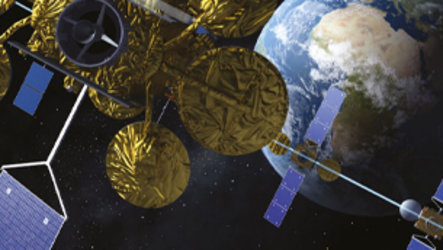First journey for Alphabus
The service module of the new Alphabus generation of telecommunication satellites has completed its first journey – from Cannes to Toulouse, in France. The three-day trip was completed last Friday.
The exceptional convoy was made up of a
This platform will be used for the

The Alphabus service module consists of the main structure, central tube, internal deck and other structural elements carrying the chemical propulsion system with the main apogee boost motor, the pressure control assembly with three helium tanks and the two large propellant tanks inside the central tube, as well as part of the plasma propulsion system and its xenon tanks.
A shipment review was held in mid-January to authorise the delivery of the module from Thales Alenia in Cannes to Astrium in Toulouse.
The last tests on the chemical propulsion system were conducted in December in the explosion-proof facility at Cannes. Preparations are under way for completing the service module at Astrium. The next step is to integrate the electronic equipment before the module is switched on for the first time and functional tests begin.

Other structural elements are also being worked on at Thales Alenia Space in Turin, Italy. The first half of the repeater module structure, fully equipped with electrical harness and thermal control, will be shipped to Astrium, Portsmouth (UK), in early February for payload integration. The second half of the repeater module will be shipped to Portsmouth in March.
Alphabus, the new European high-power telecommunications platform jointly developed by Astrium and Thales Alenia Space and initiated by a partnership between ESA and the French space agency, CNES, is a coordinated European response to the increased market demand for larger telecommunication payloads. A wide range of commercial payloads to provide TV broadcast, broadband multimedia, Internet access and mobile or fixed telecommunication services can be accommodated on Alphabus.
ESA’s Alphabus/Alphasat work is being performed as part of ‘element 8’ of the Advanced Research in Telecommunications Systems (ARTES) programme.















 Germany
Germany
 Austria
Austria
 Belgium
Belgium
 Denmark
Denmark
 Spain
Spain
 Estonia
Estonia
 Finland
Finland
 France
France
 Greece
Greece
 Hungary
Hungary
 Ireland
Ireland
 Italy
Italy
 Luxembourg
Luxembourg
 Norway
Norway
 The Netherlands
The Netherlands
 Poland
Poland
 Portugal
Portugal
 Czechia
Czechia
 Romania
Romania
 United Kingdom
United Kingdom
 Slovenia
Slovenia
 Sweden
Sweden
 Switzerland
Switzerland



























